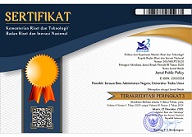Analisis Implementasi Smart Society melalui Program Gerbang Hebat di Kota Semarang
Abstract
Joint movement for poverty and unemployment reduction through harmonization of the economy, education, ecosystems and community ethos, or abbreviated Gerbang Hebat of the Semarang City Government, which was pursued in Semarang City has achieved a significant poverty reduction effort of at least 1.5% per year in accordance with the RJMD target of Semarang City in 2016-2021. The Semarang City Government in implementing the Gerbang Hebat Program joins hands with all stakeholders, namely BUMN, BUMD, Banking, Business, Private Sector, State and Private Universities, NGOs and community organizations to jointly make efforts to improve community welfare. Based on this, this study analyzes the implementation of the Gerbang Hebat program by observing the phenomenon of the implementation of program policies, namely the driving and inhibiting factors in the implementation of the Gerbang Hebat program in an effort to create an intelligent community in the city of Semarang. The approach used is a descriptive qualitative method where data collection uses interviews, observation, and documentation studies. The results of this study are the presentation of a valid, accurate, right on target, objective, and up to date database where name-based address and potential and area are still a challenge and monitoring and evaluation when the program is completed. In addition, community participation has an important role in realizing digital-based community governance. This is to ensure that activities are in accordance with the needs of the community, and ensure that these activities are sustainable activities and can lead the community towards independence.
Keywords
Full Text:
PDFReferences
Agustino, Leo. (2006). Dasar-Dasar Kebijakan Publik. Bandung: CV. Alfabeta.
Allen, B., Tamindael, L. E., Bickerton, S. H., & Cho, W. (2019). Does citizen coproduction lead to better urban services in smart cities projects ? An empirical study on e-participation in a mobile big data platform. Government Information Quarterly, May 2018, 101412. https://doi.org/10.1016/j.giq.2019.101412
Awaliyah Rizky. (2016). Implementasi Program Percepatan Penanggulangan Kemiskinan Oleh Dinas Kesejahteraan Sosial Kota Samarinda. Administrasi Negara, Volume 4 ,(1), 1–91.
Bouzguenda, I. (2019). Towards smart sustainable cities : A review of the role digital citizen participation could play in advancing social sustainability. Sustainable Cities and Society, 50(May), 101627. https://doi.org/10.1016/j.scs.2019.101627
Badan Pusat Statistik. (2020). Presentase Penduduk Miskin September 2019 turun menjadi 9,22 persen. Dapat diakses melalui https://www.bps.go.id/pressrelease/2020/01/15/1743/persentase-penduduk-miskin-september-2019-turun-menjadi-9-22-persen.html, tanggal 02 Maret 2020
De Guimarães, J. C. F., Severo, E. A., Felix Júnior, L. A., Da Costa, W. P. L. B., & Salmoria, F. T. (2020). Governance and quality of life in smart cities: Towards sustainable development goals. Journal of Cleaner Production, 253. https://doi.org/10.1016/j.jclepro.2019.119926
Fietkiewicz, K. J., Mainka, A., & Stock, W. G. (2017). eGovernment in cities of the knowledge society. An empirical investigation of Smart Cities’ governmental websites. Government Information Quarterly, 34(1), 75–83. https://doi.org/10.1016/j.giq.2016.08.003
Heaton, J., & Parlikad, A. K. (2019). A conceptual framework for the alignment of infrastructure assets to citizen requirements within a Smart Cities framework. Cities, 90(January), 32–41. https://doi.org/10.1016/j.cities.2019.01.041
Horgan, D., & Dimitrijević, B. (2019). SC. Sustainable Cities and Society, 101550. https://doi.org/10.1016/j.scs.2019.101550
Johnson, P. A., Robinson, P. J., & Philpot, S. (2019). Type , tweet , tap , and pass : How smart city technology is creating a transactional citizen. Government Information Quarterly, February, 101414. https://doi.org/10.1016/j.giq.2019.101414
Patel, Y., & Doshi, N. (2019). Social implications of smart cities. Procedia Computer Science, 155(2018), 692–697. https://doi.org/10.1016/j.procs.2019.08.099
Peraturan Walikota Semarang Nomor 26 Tahun 2018 Tentang Rencana Induk Semarang Kota Cerdas (Masterplan Semarang Smart City). (2018).
Sukardi. (2003). Metodologi Penelitian Pendidikan: Kompetensi dan Praktiknya. Jakarta: Bumi Aksara.
Sulhan, M., & Sasongko, T. (2017). IMPLEMENTASI KEBIJAKAN PROGRAM PENANGGULANGAN KEMISKINAN MELALUI KERTU PENJAMIN SOSIAL DAN KARTU INDONESIA PINTAR PADA MASYARAKAT (Studi Kasus di Kelurahan Kauman Kota Malang). Jurnal Ilmu Sosial Dan Ilmu Politik Universitas Tribhuwana Tunggadewi, 6(1), 101281.
Supangkat, S. H., & Arman, A. A. (2018). The Implementation of Garuda Smart City Framework for Smart City Readiness Mapping in Indonesia. 4, 169–176.
DOI: https://doi.org/10.35308/jpp.v7i1.3289
Refbacks
- There are currently no refbacks.
Copyright (c) 2021 Agustina Rahmawati, Hanantyo Sri Nugroho
p-ISSN: 2477-5738 I e-ISSN: 2502-0528 I DOI: 10.35308
Jl. Alue Peunyareng, Ujong Tanoh Darat, Meureubo, Kabupaten Aceh Barat, Aceh 23681, Indonesia
(0655) 7110535 l +621260313742 l +6285277110911
 is licensed under a Creative Commons Attribution-ShareAlike 4.0 International License
is licensed under a Creative Commons Attribution-ShareAlike 4.0 International License


